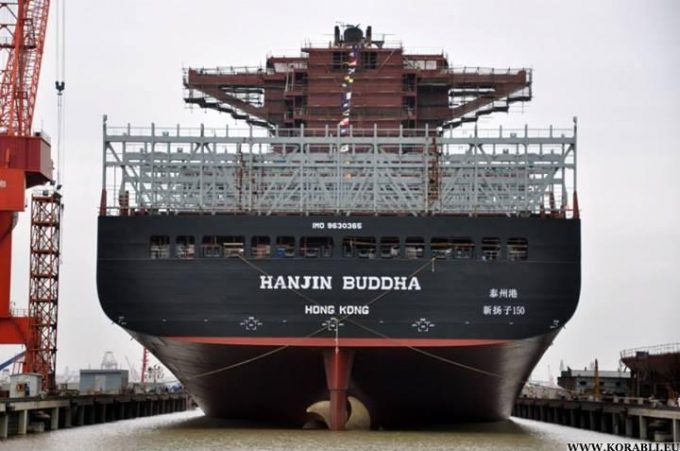Cargologicair sells off remaining stock and redundant staff can be paid
The remaining stock of Cargologicair, still under administration, is soon to be sold. The formerly ...
PLD: REBOUND MATTERSAMZN: MULTI-BILLION LONG-TERM MEXICO INVESTMENTDSV: WEAKENING TO TWO-MONTH LOWSKNIN: ANOTHER LOW PG: STABLE YIELDAAPL: GAUGING EXPECTATIONSXOM: GO GREEN NOWKNIN: BOUNCING OFF NEW LOWS HON: BREAK-UP PRESSURECHRW: UPGRADESZIM: LAGGARDFWRD: LEADINGMAERSK: OPPORTUNISTIC UPGRADETSLA: GETTING OUTDSV: DOWN BELOW KEY LEVELLINE: DOWN TO ALL-TIME LOWS
PLD: REBOUND MATTERSAMZN: MULTI-BILLION LONG-TERM MEXICO INVESTMENTDSV: WEAKENING TO TWO-MONTH LOWSKNIN: ANOTHER LOW PG: STABLE YIELDAAPL: GAUGING EXPECTATIONSXOM: GO GREEN NOWKNIN: BOUNCING OFF NEW LOWS HON: BREAK-UP PRESSURECHRW: UPGRADESZIM: LAGGARDFWRD: LEADINGMAERSK: OPPORTUNISTIC UPGRADETSLA: GETTING OUTDSV: DOWN BELOW KEY LEVELLINE: DOWN TO ALL-TIME LOWS

Financially troubled South Korean carrier Hanjin continues to owe huge sums of money to the world’s largest non-operating owner of container vessels, which yesterday warned the South Korean government that the country’s international reputation was being affected by the shipping line’s constant demands for charter rate reductions.
Gerry Wang, chief executive of Seaspan, said the company would not entertain the idea of reduced hire fees.
“We believe that is the violation of contract in the spirit of a major OECD country having $1.5trn of GDP with almost 50% derived from exports. That is not a good action. We do not support that.
“We have never had such situation with any of our other customers, Hanjin shipping has been the only one.
“They will soon realise honouring contractual obligations at the international stage is very important practice they need to follow in order to be internationally reputable.
“I believe South Korea has become a powerhouse in the world. And I believe, and I hope, Hanjin Shipping handling will be conducted accordingly,” he continued.
At Seaspan’s second-quarter results presentation yesterday, the company said that as of 30 June, Hanjin still owed it $11.6m in overdue daily hire payments for three 10,100 teu vessels on 10-year charter contracts.
Hanjin also charters four 10,100 teu ships from Greater China Intermodal Investments (GCI), a Marshall Islands-based investment vehicle set up by Seaspan and two other investors, and is also in breach of those charter parties for late payment.
Seaspan said Hanjin had been making payments, but they continued to run around 90 days late for all seven ships, fixed in 2014 at $43,000 per day.
Mr Wang confirmed that he had held discussions with Hanjin, also on behalf of GCI, but had “firmly” declined the offer of equity in a restructured Hanjin in exchange for a three-and-a-half-year reduction to charter rates.
However, he claimed, there was still an open dialogue between Seaspan and Hanjin, and commented optimistically that “we believe our Korean friends will eventually become more rational”.
His comments came during a Q&A session yesterday that followed the publication of Seaspan’s second-quarter results.
Clearly irritated by the line of questioning, Mr Wang argued that the charter hire problem related to just three of the 89 ships Seaspan had out on charter, with no payment problems with any of the other 11 ocean carrier customers.
During the second quarter, Seaspan added three newbuilds to its fleet: the 10,000 teu MOL Beyond, chartered to the Japanese carrier at a fixed rate for eight years in April, and the 14,000 teu YM Window and YM Width, fixed in May with Yang Ming for 10-year time charters.
In addition, Seaspan had agreed to acquire, from GCI, two 11,000 teu ships under construction for delivery in 2017, which have 17-year bareboat charters already agreed with MSC.
Due to its enlarged fleet, Seaspan increased its second-quarter revenue, year-on-year, by 12.6%, to $224m, kept operating costs unchanged at $49m and recorded a 25% improvement in net earnings, to $44m.
However, the shipowner has so far not made any provision for a contract default by Hanjin.
Seaspan currently has $6bn of contracted revenue, with an average remaining time charter length of five years. However, Mr Wang was not optimistic for the future of the company’s panamax vessels, seven of which have less than 30 months remaining on their charters, saying that the “good news” was that they were employed, but the “bad news” was the very depressed rates they had been fixed on.
He said Seaspan would look to scrap some panamax vessels unless the market improved.
Meanwhile, Hanjin is still trying to negotiate reductions in charter hire rates with 22 container and bulk shipowners, as part of the terms of its creditor restructure. These discussions began in May but so far have made little progress.
Comment on this article
David Lee
August 03, 2016 at 9:15 amThe share price of HMM seem to depress the investment mind for HJS. Naked short selling was increased today.